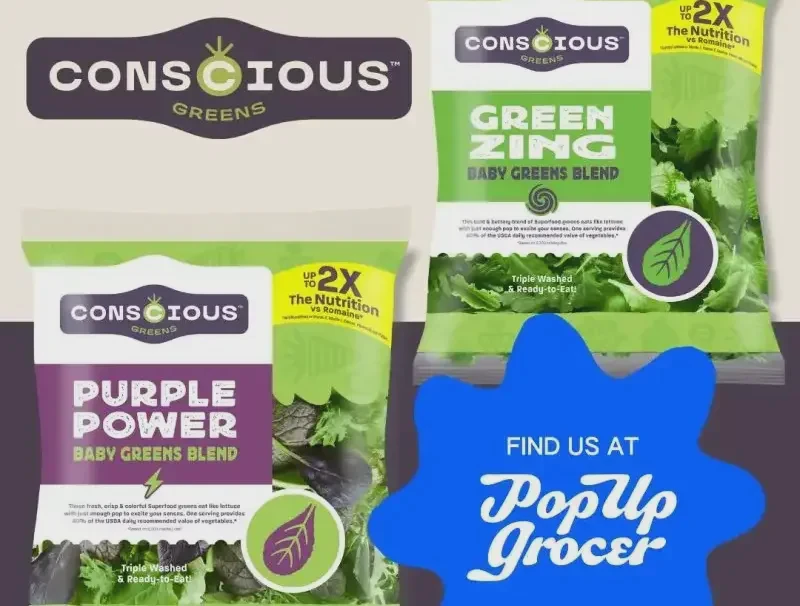Goodbye to gene-edited mustard salad: Pairwise discontinues sales of first US-approved CRISPR food
Goodbye to gene-edited mustard salad: Pairwise discontinues sales of first US-approved CRISPR food — refocuses efforts on higher value products


Last fall, when Pairwise launched Conscious Greens in select markets, it was the first food in the US developed with CRISPR technology, which allowed it to change the underlying DNA of mustard leaves to preserve their nutrition and vibrant purple hue but remove the off-putting bitter flavor commonly associated with members of the brassica family.
The launch gave the company a chance to test its hypothesis that when consumers were presented with a product that offered them tangible benefits, and which tasted good and was convenient, they would accept the technology used to create it.
“We passed with flying colors and received really, really positive feedback from consumers,” CEO and co-founder Tom Adams told FoodNavigator-USA.
However, Adams said, the company also realized that it did not have the resources to effectively market the salad kits and continue developing gene-edited products.
“Every dollar we spend on marketing is a dollar we don’t spend on producing the next interesting product,” Adams said.
…
This pivot will allow the company to “double down on our core competencies of the technology that we’re using to develop really unique products, like the salads,” including “game-changing product innovations,” such as seedless blackberries and pitless cherries made with CRISPR technology, Adams said.
This is an excerpt. Read the original post here

 | Videos | More... |

Video: Nuclear energy will destroy us? Global warming is an existential threat? Chemicals are massacring bees? Donate to the Green Industrial Complex!
 | Bees & Pollinators | More... |

GLP podcast: Science journalism is a mess. Here’s how to fix it

Mosquito massacre: Can we safely tackle malaria with a CRISPR gene drive?

Are we facing an ‘Insect Apocalypse’ caused by ‘intensive, industrial’ farming and agricultural chemicals? The media say yes; Science says ‘no’
 | Infographics | More... |

Infographic: Global regulatory and health research agencies on whether glyphosate causes cancer
 | GMO FAQs | More... |

Why is there controversy over GMO foods but not GMO drugs?

How are GMOs labeled around the world?

How does genetic engineering differ from conventional breeding?
 | GLP Profiles | More... |

Alex Jones: Right-wing conspiracy theorist stokes fear of GMOs, pesticides to sell ‘health supplements’




 Viewpoint — Fact checking MAHA mythmakers: How wellness influencers and RFK, Jr. undermine American science and health
Viewpoint — Fact checking MAHA mythmakers: How wellness influencers and RFK, Jr. undermine American science and health Viewpoint: Video — Big Solar is gobbling up productive agricultural land and hurting farmers yet providing little energy or sustainabilty gains
Viewpoint: Video — Big Solar is gobbling up productive agricultural land and hurting farmers yet providing little energy or sustainabilty gains Fighting deforestation with CO2: Biotechnology breakthrough creates sustainable palm oil alternative for cosmetics
Fighting deforestation with CO2: Biotechnology breakthrough creates sustainable palm oil alternative for cosmetics Trust issues: What happens when therapists use ChatGPT?
Trust issues: What happens when therapists use ChatGPT? 30-year-old tomato line shows genetic resistance to devastating virus
30-year-old tomato line shows genetic resistance to devastating virus California, Washington, Oregon forge immunization alliance to safeguard vaccine access against federal undermining
California, Washington, Oregon forge immunization alliance to safeguard vaccine access against federal undermining The free-range chicken dilemma: Better for birds, but with substantial costs
The free-range chicken dilemma: Better for birds, but with substantial costs ‘You have to treat the brain first’: Rethinking chronic pain with Sanjay Gupta
‘You have to treat the brain first’: Rethinking chronic pain with Sanjay Gupta
